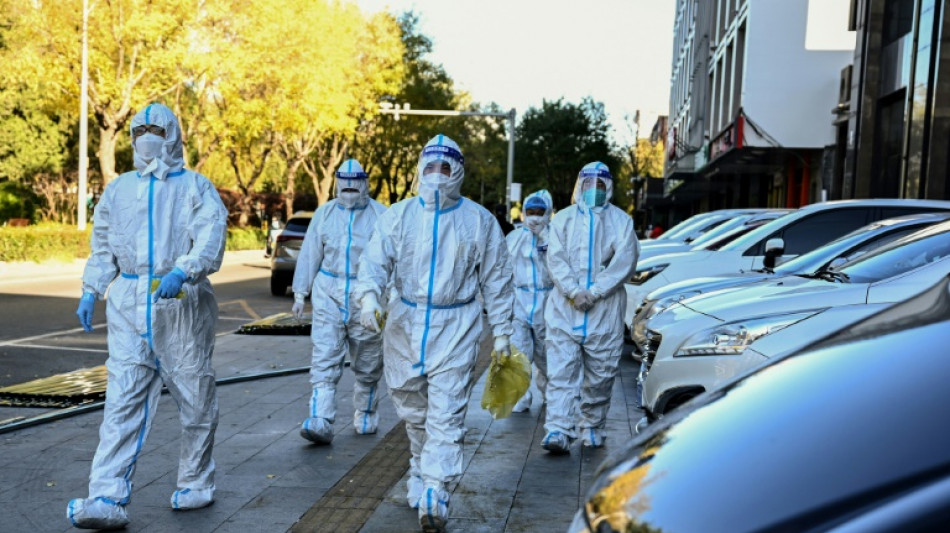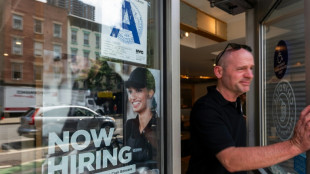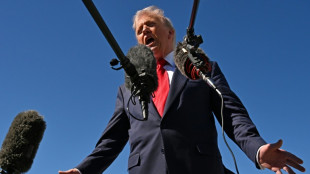
-
 Spain's exiled king recounts history, scandals in wistful memoir
Spain's exiled king recounts history, scandals in wistful memoir
-
Wall Street stocks steady after positive jobs data

-
 Trump blasts Democrats as government shutdown becomes longest ever
Trump blasts Democrats as government shutdown becomes longest ever
-
Indian pilgrims find 'warm welcome' in Pakistan despite tensions

-
 Inter and AC Milan complete purchase of San Siro
Inter and AC Milan complete purchase of San Siro
-
Swedish authorities inspect worksite conditions at steel startup Stegra

-
 Keys withdraws from WTA Finals with illness
Keys withdraws from WTA Finals with illness
-
Prince Harry says proud to be British despite new life in US

-
 EU strikes last-ditch deal on climate targets as COP30 looms
EU strikes last-ditch deal on climate targets as COP30 looms
-
Stocks retreat as tech bubble fears grow

-
 Shein opens first permanent store amid heavy police presence
Shein opens first permanent store amid heavy police presence
-
West Indies edge New Zealand despite Santner brilliance

-
 French pair released by Iran await return home
French pair released by Iran await return home
-
German factory orders up but outlook still muted

-
 Death toll tops 100 as Philippines digs out after typhoon
Death toll tops 100 as Philippines digs out after typhoon
-
Attack on key city in Sudan's Kordofan region kills 40: UN

-
 'No one could stop it': Sudanese describe mass rapes while fleeing El-Fasher
'No one could stop it': Sudanese describe mass rapes while fleeing El-Fasher
-
Champagne and cheers across New York as Mamdani soars to victory

-
 Medieval tower collapse adds to Italy's workplace toll
Medieval tower collapse adds to Italy's workplace toll
-
BMW boosts profitability despite China, tariff woes

-
 South Africa's Wiese wary of 'hurt' France before re-match
South Africa's Wiese wary of 'hurt' France before re-match
-
Beyond limits: Croatian freediver's breathtaking record

-
 Tottenham supporting Udogie after alleged gun threat in London
Tottenham supporting Udogie after alleged gun threat in London
-
Thunder roll Clippers to stay unbeaten as SGA keeps streak alive

-
 In appeal, Australian mushroom murderer alleges 'miscarriage of justice'
In appeal, Australian mushroom murderer alleges 'miscarriage of justice'
-
Toyota hikes profit forecasts 'despite US tariffs'

-
 Ex-France lock Willemse challenges Meafou to become 'the bully'
Ex-France lock Willemse challenges Meafou to become 'the bully'
-
Ukrainians to honour sporting dead by building country they 'died for': minister

-
 At least 7 dead after UPS cargo plane crashes near Louisville airport
At least 7 dead after UPS cargo plane crashes near Louisville airport
-
US Supreme Court hears challenge to Trump tariff powers

-
 US government shutdown becomes longest in history
US government shutdown becomes longest in history
-
India's Modi readies bellwether poll in poorest state

-
 Green goals versus growth needs: India's climate scorecard
Green goals versus growth needs: India's climate scorecard
-
Where things stand on China-US trade after Trump and Xi talk

-
 Sri Lanka targets big fish in anti-corruption push
Sri Lanka targets big fish in anti-corruption push
-
NY elects leftist mayor on big election night for Democrats

-
 Injured Jordie Barrett to miss rest of All Blacks tour
Injured Jordie Barrett to miss rest of All Blacks tour
-
Asian markets tumble as tech bubble fears grow

-
 Pay to protect: Brazil pitches new forest fund at COP30
Pay to protect: Brazil pitches new forest fund at COP30
-
Iraq's social media mercenaries dying for Russia

-
 Young leftist Trump foe elected New York mayor
Young leftist Trump foe elected New York mayor
-
Concerns at ILO over expected appointment of close Trump advisor

-
 Venus Williams to return to Auckland Classic at the age of 45
Venus Williams to return to Auckland Classic at the age of 45
-
No deal yet on EU climate targets as COP30 looms

-
 Typhoon death toll climbs to 66 in the Philippines
Typhoon death toll climbs to 66 in the Philippines
-
NATO tests war preparedness on eastern flank facing Russia

-
 Uncapped opener Weatherald in Australia squad for first Ashes Test
Uncapped opener Weatherald in Australia squad for first Ashes Test
-
Liverpool down Real Madrid in Champions League, Bayern edge PSG

-
 Van Dijk tells Liverpool to keep calm and follow Arsenal's lead
Van Dijk tells Liverpool to keep calm and follow Arsenal's lead
-
PSG left to sweat on injuries to Dembele and Hakimi


Confusion, fear cloud China's path out of zero-Covid
With megacities under lockdown, infection numbers climbing and sporadic protests, China's Covid-19 policy has reached a stalemate as authorities persist with seeking to contain the virus while trying to keep the economy alive.
China is the only major economy still attempting to stamp out the domestic spread of the virus, shutting down entire cities and placing contacts of infected patients into strict quarantine.
A series of new rules announced by Beijing earlier this month appeared to signal a shift away from the strategy, easing quarantine requirements for entering the country and simplifying a system for designating high-risk areas.
Yet daily cases driven by the evasive Omicron variant have neared 30,000 -- low compared to most other large countries but reaching peaks unseen since the chaotic days of Shanghai's harsh lockdown in the spring.
That has caused whiplash among China's urban residents, as officials first eased restrictions before reimposing curbs, all the while claiming to be finetuning the zero-Covid strategy personally championed by President Xi Jinping.
And the flip-flopping has rattled investors, causing global financial markets to wobble.
Yanzhong Huang, senior fellow for global health at the Council on Foreign Relations, told AFP it was too early to say if the new rules "signal that the central leadership is willing to give up zero-Covid anytime soon".
"Local governments' incentive structure has not been fundamentally changed by the new adjustments," Huang said, noting that lower level officials were still being held accountable for outbreaks.
- Mixed signals -
Chinese officials have responded to growing infections this month with vague and seemingly contradictory messaging that has sparked public confusion.
Multiple cities cancelled mandatory regular Covid tests last week, with some backtracking within days.
One of the capital's largest districts, Chaoyang, abruptly shuttered testing booths in its commercial areas early last week, with the faint explanation that it was in line with the central government's new Covid rules.
The closures were reversed the next day after local media reported that office workers had been left trawling residential compounds for hours in search of an open testing booth as public spaces tightened testing requirements over a surge in cases.
Public anger over seemingly arbitrary restrictions and sudden disruptions has erupted in numerous protests in recent months, including in southern China's Guangzhou this month when hundreds of residents took to the streets.
"Most officials in China know that the policy as it is no longer makes sense, but no one can fail to implement it as it is Xi's policy and must be upheld," Steve Tsang, director of the SOAS China Institute in London, told AFP.
"We are seeing some adjustments being made without sufficient clarity," he said.
Alfred Wu, associate professor at Singapore's Lee Kuan Yew School of Public Policy, said there was a growing tension between the goals of the central government and those of local officials.
"The anger actually comes from ordinary people and also local public officials," whose resources and time are spent overwhelmingly on zero-Covid measures, Wu told AFP.
- Reopening risks -
Another year of zero-Covid could mean the "Chinese economy will be derailed and social tensions may reach a tipping level, which threatens regime stability and may even cause a legitimacy crisis", Huang of the CFR said.
But opening up too suddenly could also threaten stability, as the country may "face a viral wave that results in mass die-off and quickly overwhelms its fragile healthcare system", he told AFP.
China has not yet approved more effective mRNA vaccines for public use, and only 85 percent of adults over 60 had received two doses of domestic vaccines by mid-August, according to Chinese health authorities.
Nomura analysts said on Monday the road to reopening could be "slow and bumpy".
"Reopening could be back and forth as policymakers may back down after observing rapid increases in cases and social disruptions," they said in a report.
They predicted a negative impact on GDP growth when Covid cases surge after the zero-Covid policy is lifted, as "a large percentage of the Chinese population may still believe Omicron has a high mortality rate."
Messaging on the virus will be a major challenge for Chinese authorities as they navigate a return to normality.
"The scary propaganda about the virus and how other countries have fared worse than China, ironically, is coming back to bite CCP leaders who may now indeed be eager to relax the very invasive and costly anti-Covid measures," Fei-Ling Wang, international affairs professor at Georgia Tech, told AFP.
"A quick turnaround to open up would risk losing face for the leaders," he said.
G.Schulte--BTB




